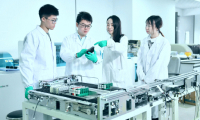Shenzhen University Medicine Forum: Translational Medicine Empowering New Drug Development
On December 4, 2024, at the invitation of Professor Peng Huang from the School of Biomedical Engineering at Shenzhen University Medical School, Professor Rui-Ping Xiao, Chair Professor at Peking University, Dean of the College of Future Technology, and Associate Editor of the New England Journal of Medicine, was invited as the 124th guest speaker of the "Deep Medicine Lecture." She delivered an academic presentation titled "Empowering New Drug Research and Development with Translational Medicine" in the lecture hall on the first floor of the Shouzhong Building (A5) at the Lihu Campus. The forum was chaired by Professor Peng Huang, and Vice President Hui Zhou attended in person. The forum attracted a large audience of faculty and students from various colleges of Shenzhen University, the Chinese Academy of Sciences Shenzhen Institute of Advanced Technology, Peking University Shenzhen Graduate School, and other institutions.

During her talk, Professor Xiao shared her journey in translational medicine at Huazhong University of Science and Technology, the University of Maryland, the National Institute on Aging (NIA), the National Institutes of Health (NIH), Peking University, and the New England Journal of Medicine. She made "creating an innovative drug for a lifetime" her lifelong pursuit. Professor Xiao highlighted the crucial role of G protein-coupled receptors in the occurrence and development of major cardiovascular diseases, such as inflammation, atheromatous plaques, myocardial infarction, and heart failure. Her team discovered the protective role of the human adrenergic receptor β2AR in the heart and proposed a treatment strategy combining β1AR blockers with β2AR agonists to prevent the expansion of myocardial infarction.
Additionally, Professor Xiao discussed the key role of the muscle cytokine MG53 in systemic insulin resistance, as well as in glucose and lipid metabolism, and developed its mutant as a protein drug for emergency treatment of myocardial infarction. She also addressed the significant upregulation of prolactin in uterine fibroid cells, leading to the development of HMI-115, an antibody that neutralizes prolactin for the treatment of endometriosis. Furthermore, Professor Xiao proposed the lactate receptor GPR81 as a new target for research into the treatment of cachexia.
Finally, Professor Xiao emphasized the importance of discovering new drug targets and developing innovative drugs to meet clinical needs. She introduced the new paradigm of "industry-education integration," which merges the innovation chain, transformation chain, and talent cultivation chain. Her academic report showcased a series of cutting-edge research achievements in innovative drug development, sparking lively discussions among teachers and students. During the interactive session, faculty and students actively asked questions, and Professor Xiao patiently and thoroughly answered them, creating an engaging atmosphere.

Vice President Hui Zhou presented Professor Rui-Pin Xiao with the "Shenzhen University Medicine Forum" Honorary Medal


Brief introduction of the Speaker:
Rui-Ping Xiao, PhD, is a recipient of the National Science Fund for Distinguished Young Scholars and a Chair Professor at Peking University. Professor Xiao formerly served as the founding director of the Peking University Institute of Molecular Medicine and currently serves as the Dean of the College of Future Technology. With a long-standing focus on basic and translational research in cardiovascular and metabolic diseases, Professor Xiao is a member of the Mid-Atlantic Affiliate Board of the American Heart Association. She also serves as an associate editor for The New England Journal of Medicine, was a council member of the International Society for Heart Research (ISHR) from 2002 to 2021 and was elected a fellow of the American Society for Clinical Investigation in 2024.








用户登录
还没有账号?
立即注册